7 Health Benefits Of Coriander Seeds, Nutrition, & Side Effects
You won't find an Indian spice cabinet without a jar full of these tiny flavor-packed seeds.
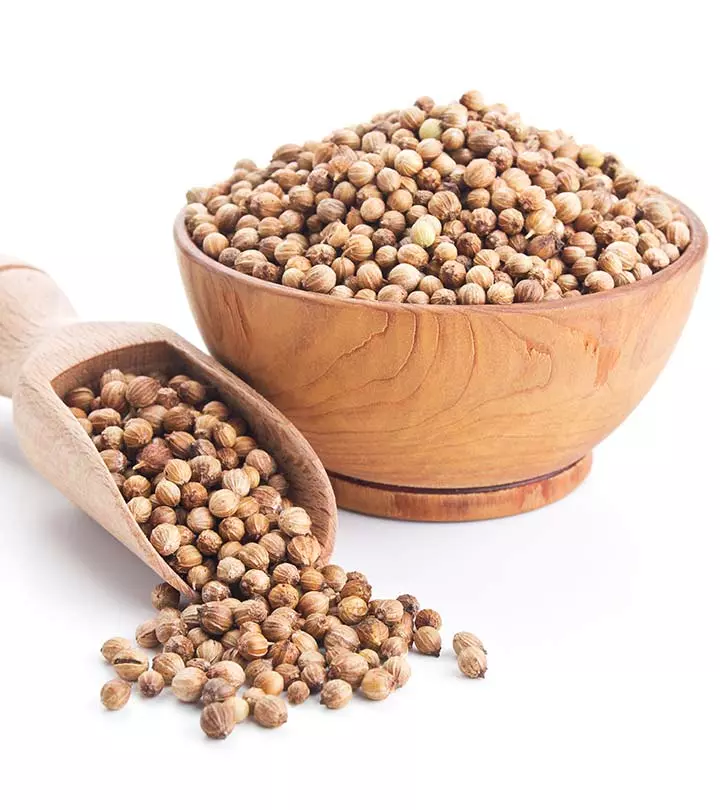
Image: ShutterStock
Coriander seeds are used in many cuisines across the globe, especially Indian curries. They come from the cilantro plant. These round and small seeds have a unique citrus flavor and are yellowish-brown or green colored.
The health benefits of coriander seeds are gaining popularity. Some studies state that these seeds can lower cholesterol levels (1). Also, they can relieve the symptoms of arthritis and help manage diabetes. However, quality research is still warranted to understand other benefits these seeds offer.
This article has discussed how coriander seeds can benefit you if included in your diet. Learn more about them by scrolling down further!
 Know Your Ingredient: Coriander Seed
Know Your Ingredient: Coriander SeedWhat Is It?
Yellow, round seed of the cilantro plant that has a citrus taste.
What Are Its Benefits?
It lowers cholesterol, boosts digestion, and eases menstrual discomfort.
Who Can Consume It?
Anyone can consume it except people on blood sugar and diabetes medications.
How Often?
You can consume 1 tablespoon of coriander seeds daily.
Caution
Avoid consuming coriander seeds 2 weeks before surgery. Excess consumption may cause itchiness, fever, or nasal swelling.
In This Article
What Are The Health Benefits Of Coriander Seeds?
The antioxidants in coriander seeds promote heart health by lowering blood cholesterol levels and reducing blood pressure
. The fiber in the seeds boosts lipid metabolism. The fatty acids (linoleic, oleic, and palmitic acids) and essential oils (linalool, camphene, and terpene) are responsible for the digestive and carminative properties of coriander seeds.
1. Promote Heart Health
Coriander seeds have a remarkable cholesterol-lowering action. Rat studies showed that those fed with coriander seeds experienced a decrease of total cholesterol and triglycerides in their tissues (2).
The seeds also improved the levels of good cholesterol (2).
Coriander seeds can also inhibit the aggregation of human platelets. If platelet aggregation occurs in the arteries, it can lead to impaired blood flow to the heart and eventual heart attack (2).
Coriander plays an important role in the metabolism of lipids in the human system. Studies show that it can also regulate blood pressure levels (3).
The antioxidant properties of coriander seeds may help lower blood pressure levels. They help widen blood vessels, thereby lowering blood pressure (4).
2. Aid Diabetes Treatment
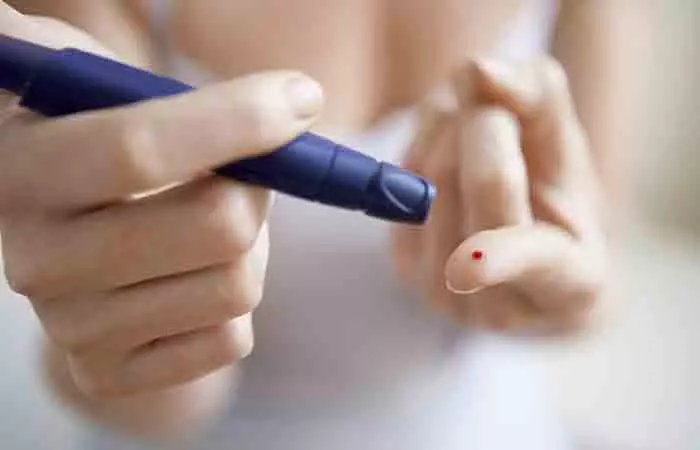
Coriander seeds can help lower blood sugar levels. They achieve this by improving the function of the pancreatic beta cells (cells that release insulin and regulate blood sugar levels) (5).
Other studies also validate the use of coriander seeds for managing diabetes. In a rat study, the extracts of coriander seeds not only regularized blood sugar levels but also improved other factors associated with metabolic syndrome (6).
Regular intake of coriander seeds can also reduce the risk of cardiovascular complications associated with prediabetesi A condition in which blood glucose levels become too high but not high enough to be categorized as type 2 diabetes. , type 2 diabetes, and metabolic syndrome (7).
3. Enhance Digestion

Coriander seeds have long been used as digestive stimulants (8). The seeds may stimulate the liver to produce and secrete concentrated bile acids. These acids play an important role in digestion and absorption.
Coriander seeds also have carminative effects (relieving flatulence (8).
The seeds also enhance digestion by improving the activity of trypsin, a pancreatic enzyme that breaks down proteins in the small intestine (8).
Coriander seeds offer these digestive benefits best when included in your daily diet (8).
The oil from coriander seeds can also relieve the painful symptoms of irritable bowel syndrome (9). The antibacterial properties of the seeds may be responsible for this effect.
Coriander seeds can also help cure nausea and diarrhea (10). You can drink tea made from the seeds (steeping the seeds in hot water and then draining them after 15 to 20 minutes) to achieve these benefits.
4. May Relieve Arthritis Symptoms
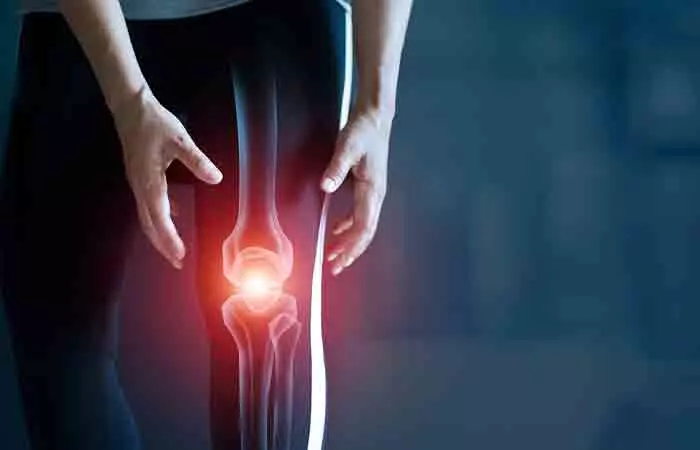
Coriander seeds can relieve arthritis pain by fighting the activity of pro-inflammatory cytokines in the synovium (a membrane that lines the inner surface of a joint) (11). Pro-inflammatory cytokines are compounds in the human system that promote inflammation.
Coriander seeds can be used externally as a poultice to treat arthritis pain. Cineole and linoleic acid, two important compounds in the seeds, offer anti-rheumatici The property of a drug used to treat inflammation caused by rheumatoid arthritis. They also help slow down its progression. and anti-arthritici A group of drugs used to relieve arthritic pain and help treat symptoms, such as joint pain and stiffness. properties (12).
5. May Help Treat Conjunctivitis
Research shows that coriander seeds can treat itchy eyes, a major symptom of conjunctivitis (13). In the study, the group treated with a coriander seed spray experienced improved symptoms of conjunctivitis and itchy eyes.
6. May Promote Menstrual Health
There is very less research available on the efficacy of coriander seeds in treating menstrual symptoms. According to Persian medicine, including coriander (Coriandrum sativum) in your diet is believed to be beneficial for menstrual health as it is considered an astringent that can help reduce bleeding (14).
7. Boost Neurological Health
Linalool is a major compound in coriander seeds (and their oil). Studies show that linalool can reduce anxiety in humans (15).
Linalool has beneficial effects on the central nervous system. It also has anticonvulsant properties (reduces the risk of seizures or epileptic fits) (15).
The seeds can also play a protective role in the prevention of neurological diseases like Alzheimer’si A progressive neurological disease that contracts brain cells and impairs memory, among other cognitive functions. . They were found to improve memory in mice, though the effects have been noticed only in coriander leaves (16).
Coriander seeds are a common ingredient. They are often added to dishes to enhance their taste and flavor. But not many are aware of the incredible benefits the seeds offer.
 Fun Fact
Fun FactThey have an exemplary nutrition profile. The following section showcases that in detail.
What Is The Nutrition Profile* Of Coriander Seeds?
| Nutrient | Unit | 1Value per 100 g | 1 tsp = 1.8g | 1 tbsp = 5.0g |
|---|---|---|---|---|
| Proximates | ||||
| Water | g | 8.86 | 0.16 | 0.44 |
| Energy | kcal | 298 | 5 | 15 |
| Protein | g | 12.37 | 0.22 | 0.62 |
| Total lipid (fat) | g | 17.77 | 0.32 | 0.89 |
| Carbohydrate, by difference | g | 54.99 | 0.99 | 2.75 |
| Fiber, total dietary | g | 41.9 | 0.8 | 2.1 |
| Minerals | ||||
| Calcium, Ca | mg | 709 | 13 | 35 |
| Iron, Fe | mg | 16.32 | 0.29 | 0.82 |
| Magnesium, Mg | mg | 330 | 6 | 16 |
| Phosphorus, P | mg | 409 | 7 | 20 |
| Potassium, K | mg | 1267 | 23 | 63 |
| Sodium, Na | mg | 35 | 1 | 2 |
| Zinc, Zn | mg | 4.7 | 0.08 | 0.23 |
| Vitamins | ||||
| Vitamin C, total ascorbic acid | mg | 21 | 0.4 | 1.1 |
| Thiamin | mg | 0.239 | 0.004 | 0.012 |
| Riboflavin | mg | 0.29 | 0.005 | 0.014 |
| Niacin | mg | 2.13 | 0.038 | 0.106 |
| Lipids | ||||
| Fatty acids, total saturated | g | 0.99 | 0.018 | 0.05 |
| Fatty acids, total monounsaturated | g | 13.58 | 0.244 | 0.679 |
| Fatty acids, total polyunsaturated | mg | 1.75 | 0.032 | 0.087 |
*values sourced from USDA, spices, coriander seed
Including coriander seeds in your diet is quite simple. But if you do not want to go the regular way, check out the options in the next section.
How To Include Coriander Seeds In Your Diet
Do keep in mind to buy coriander seeds and not coriander powder. The latter loses its flavor rather quickly. You can buy the seeds from your nearest supermarket or online.
Matt, a blogger, who undertook the task of harvesting coriander seeds by himself, marveled at the results: “The taste difference is why I say I have changed my views of purchasing fresh spices. The seeds I harvested compared to the seeds I bought were worlds apart. The harvested seeds are complex. They have the taste of coriander that one would expect but that is the second thing that you taste, the first is fresh cilantro (i).”
Before you use them in your cooking, you need to first prepare them. Dry fry the seeds. Heat a frying pan (no oil) and add the seeds and fry them over medium heat. When you sense the warm aroma being released, you know that the seeds are ready. Remove from the pan and let them cool.
You can then enjoy the seeds in the following ways:
- Add the seeds to broths or soups.
- Add them to the poaching liquid while preparing fish.
- Combine the seeds with spinach, fresh garlic, and garbanzo beans. Season with ginger and cumin for a healthful snack.
It is hard to substitute coriander seeds with anything else, given their distinct flavor. But if the need arises, you can combine crushed fennel, caraway seeds, and some cumin (jeera).
 Trivia
TriviaYou can store the seeds in an airtight jar in a cool and dry place for several months. In addition, you can try this condiment in many culinary recipes as a seasoning either as seeds or in form of powder after grinding them. You can also use them for pickling.
Apart from coriander seeds, coriander leaves are used to garnish food items. This herb or herbaceous plant is native to the Mediterranean region and used extensively in Middle Eastern cuisine. Scroll down to learn a simple recipe with this herb!
Coriander Recipe
Coriander Chutney
Ingredients
- 3 cups of coriander
- 1-1/2 teaspoon of roasted cumin powder
- 1 to 2 green chilies
- 4 to 6 tablespoons of cold water
- 2 to 3 medium garlic cloves
- ½ teaspoon of salt
- 1 tablespoon of lemon juice
- 3 tablespoons of roasted peanuts
How To Prepare
- Add peanuts, green chilies, salt, cumin, garlic, coriander leaves, lemon juice, and water in a blender jar.
- Blend the ingredients to a smooth paste.
- Check the consistency of the paste and add more water if required. The paste should neither be too thick nor runny.
- Serve as a condiment with roti or rice.
Before you go ahead and get your pack of fresh coriander seeds, you must know something else.
Do Coriander Seeds Have Any Side Effects?
Coriander seeds have many health benefits. But, overconsumption can cause complications. In the section below, we have discussed the common side effects of coriander seeds –
- May Cause Allergies
Coriander seeds may cause allergies in some individuals (due to cross-reactivity by the mugwort pollen) (17). The symptoms might include any or all of the following – itching of the lips, mouth, and throat, itchy eyes, and fever.
Stop intake if you notice any of these symptoms.
- May Lower Blood Sugar Way Too Much
We know that coriander seeds can lower blood sugar levels (5). Hence, if you are already on medications for high blood sugar, please check with your doctor. They can adjust your dosage accordingly. You might have to control the quantity of coriander seeds that you consume.
- May Lower Blood Pressure Way Too Much
As we know, coriander seeds can lower blood pressure levels (3). If you are already on blood pressure medication, please check with your doctor before consuming coriander seeds.
Infographic: How To Prepare Coriander Tea?
Besides being a popular kitchen spice, coriander seeds are better known for their medicinal properties. They have numerous health benefits, from promoting heart health to treating itchy eyes. Incorporating coriander tea is one simple way to enjoy these benefits. But how can you prepare it? We have discussed the same in the infographic below. Illustration: StyleCraze Design Team

Coriander seeds are small greenish-brown seeds with a distinct citrus flavor. However, you can consume them after following either of the cooking techniques — frying or roasting. These seeds have a rich nutritional profile that offers a range of benefits. They possess active compounds like essential oils, antioxidants, dietary fiber, and fatty acids that are beneficial to the body. They can promote your heart, gut, and menstrual health. They also may relieve arthritis pain and protect against neurological diseases like Alzheimer’s. Nevertheless, they also may cause an allergic reaction in some. Hence, be cautious before using coriander seeds. Consuming the seeds may also lower your blood sugar and blood pressure levels – hence, be sure to consult your physician if you are taking medications for any of these conditions.
Frequently Asked Questions
What do coriander seeds taste like?
Coriander seeds have a mellow flavor. However, when roasted, they have a nutty aroma.
Are coriander seeds good for kidneys?
Yes, coriander seeds are good for kidneys. They effectively help treat urinary tract infections.
Is it OK to eat raw coriander seeds?
Yes, coriander seeds can be consumed raw. They can also be mixed with water or be taken after roasting.
Are coriander seeds good for weight loss?
Yes, coriander seeds are good for weight loss. They are loaded with many nutrients that promote metabolism and accelerate weight loss when coupled with a healthy exercise regimen and the right lifestyle practices.
Key Takeaways
- Coriander seeds contain antioxidants that may help promote heart health by lowering blood cholesterol levels and reducing blood pressure.
- Coriander seeds may help to improve digestion and treat nausea, and diarrhea.
- It may help treat arthritis pain and menstrual discomfort such as cramps.
- These seeds may help to keep the nervous system healthy and reduce anxiety.
- Include these seeds in your diet by adding them to soup or combining them with spinach and garlic
Illustration: Health Benefits Of Coriander Seeds Nutrition & Side Effects
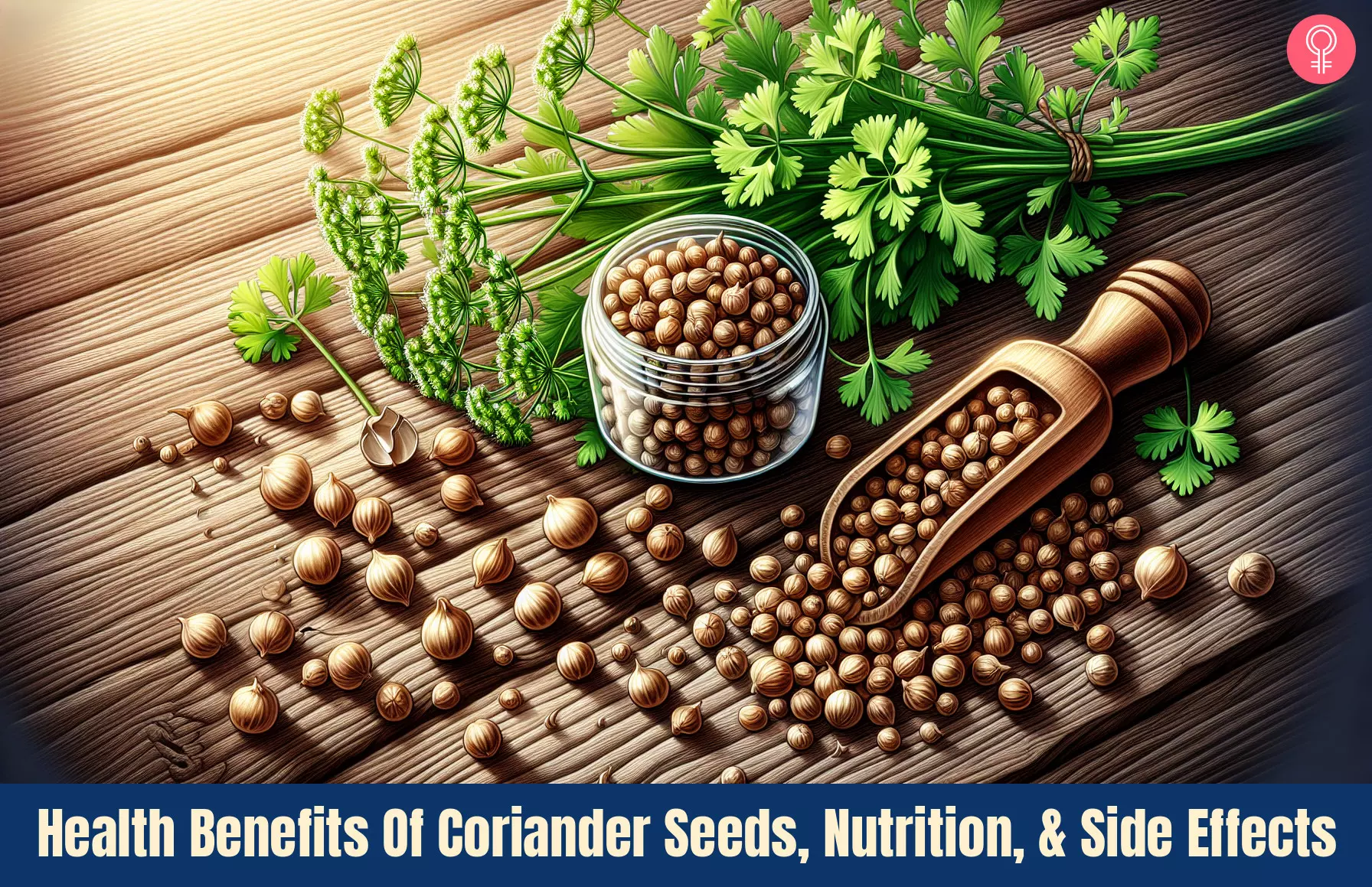
Image: Dall·E/StyleCraze Design Team
Learn how to make your own anti-aging superfood face masks at home! Click on this video to find out how to make face masks using natural ingredients and get glowing skin.
Personal Experience: Source
StyleCraze's articles are interwoven with authentic personal narratives that provide depth and resonance to our content. Below are the sources of the personal accounts referenced in this article.
i. Finished Coriander Seed Projecthttps://thymeforfood.wordpress.com/2008/07/03/finished-coriander-seed-project/
References
Articles on StyleCraze are backed by verified information from peer-reviewed and academic research papers, reputed organizations, research institutions, and medical associations to ensure accuracy and relevance. Read our editorial policy to learn more.
-
- “
Hypolipidemic effect of coriander seeds…
- ” Plant Foods for Human Nutrition, US National Library of Medicine, National Institutes of Health.
- “Indian spices for healthy heart…” Current Cardiology Reviews, US National Library of Medicine, National Institutes of Health.
- “Supplementation of garlic and coriander seed powder…” Pakistan Journal of Pharmaceutical Sciences, US National Library of Medicine, National Institutes of Health.
- “Anti-hypertensive herbs and their mechanisms…” Frontiers in Pharmacology, US National Library of Medicine, National Institutes of Health.
- “Effect of coriander seed ethanol extract…” Phytotherapy Research, US National Library of Medicine, National Institutes of Health.
- “Hypoglycemic and hypolipidemic effects of…” Journal of Ethnopharmacology, US National Library of Medicine, National Institutes of Health.
- “Coriandrum sativum…” International Journal of Pharmaceutical Sciences and Research.
- “Digestive stimulant action of spices…” Indian Journal of Medical Research.
- “Comparison of the antibacterial activity of…” BMC Complementary and Alternative Medicine, US National Library of Medicine, National Institutes of Health.
- “Green medicine: Traditional Mexican-American…” Institute of Education Sciences.
- “Evaluation of disease modifying activity of…” Indian Journal of Medical Research, US National Library of Medicine, National Institutes of Health.
- “Medicinal plants with potential…” Journal of Intercultural Ethnopharmacology.
- “Effect of Coriandrum sativum seed…” Academia.
- “Non-pharmacologic Treatment of…” Galen Medical Journal.
- “Anti-anxiety activity of Coriandrum…” Indian Journal of Pharmacology, US National Library of Medicine, National Institutes of Health.
- “Reversal of memory deficits…” Journal of the Science of Food and Agriculture, US National Library of Medicine, National Institutes of Health.
- “Cross-reactivity syndromes…” The Turkish Journal of Pediatrics.
Read full bio of Dr. Geeta Dharmatti
Read full bio of Arshiya Syeda
Read full bio of Aparna Mallampalli





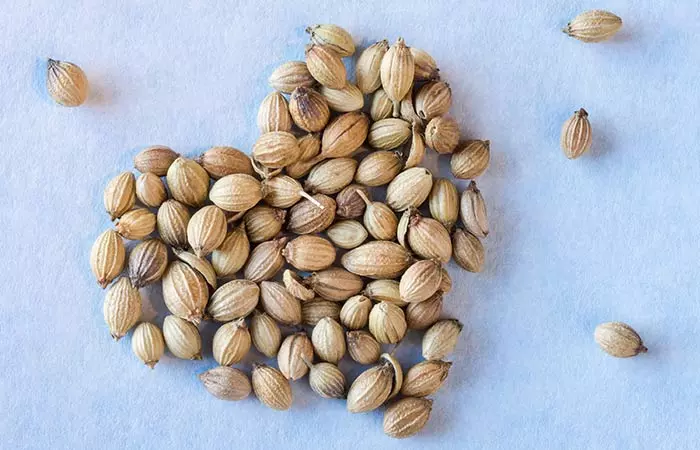

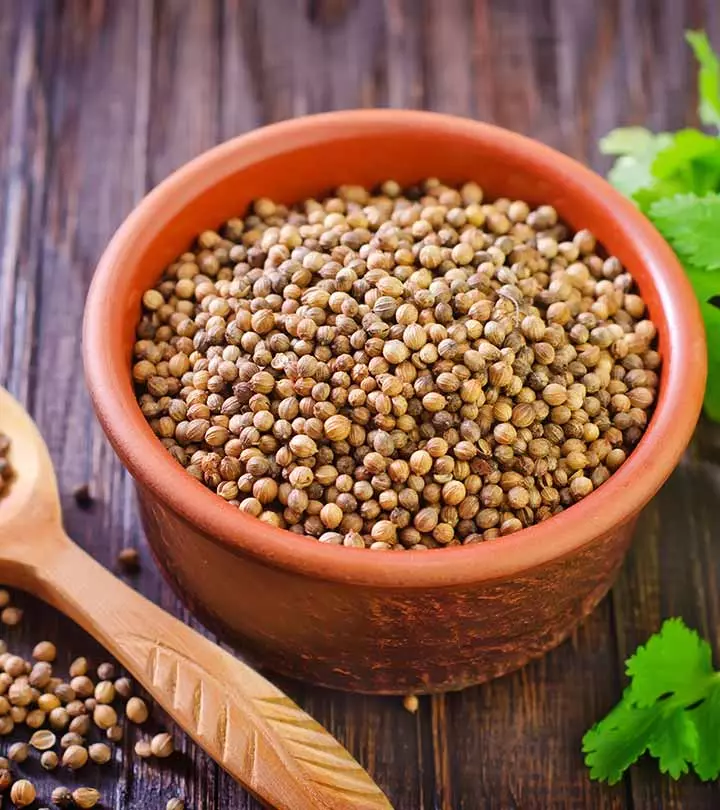
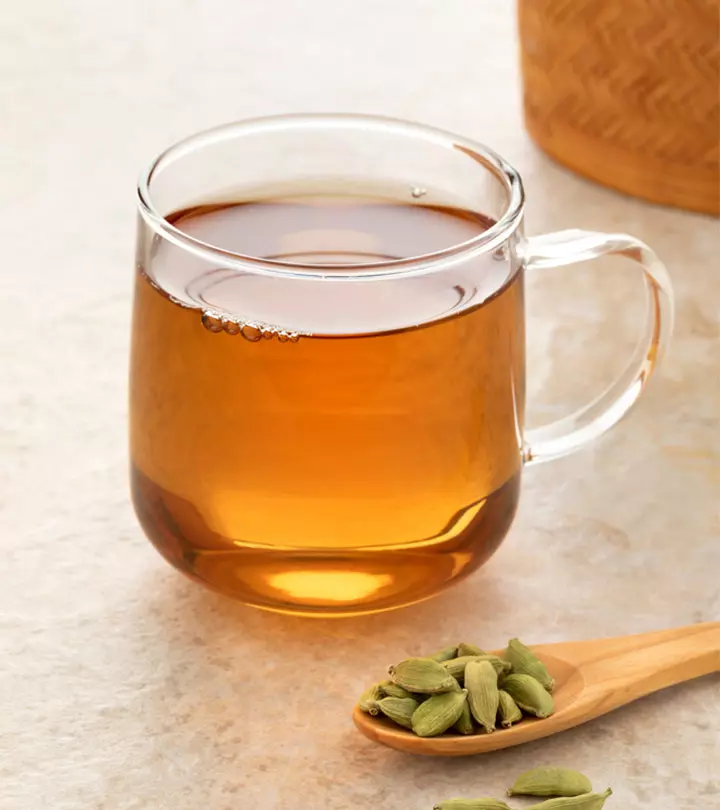
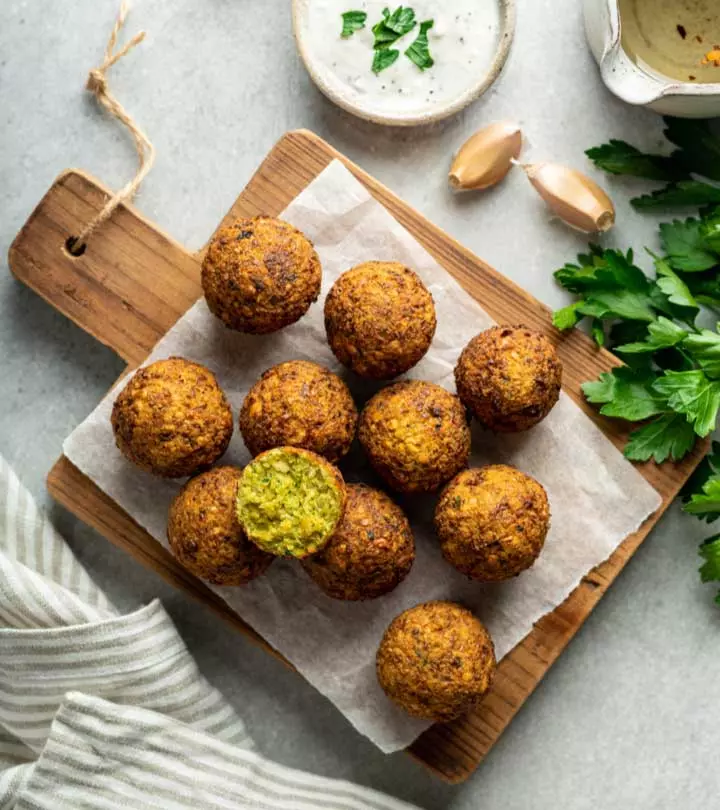
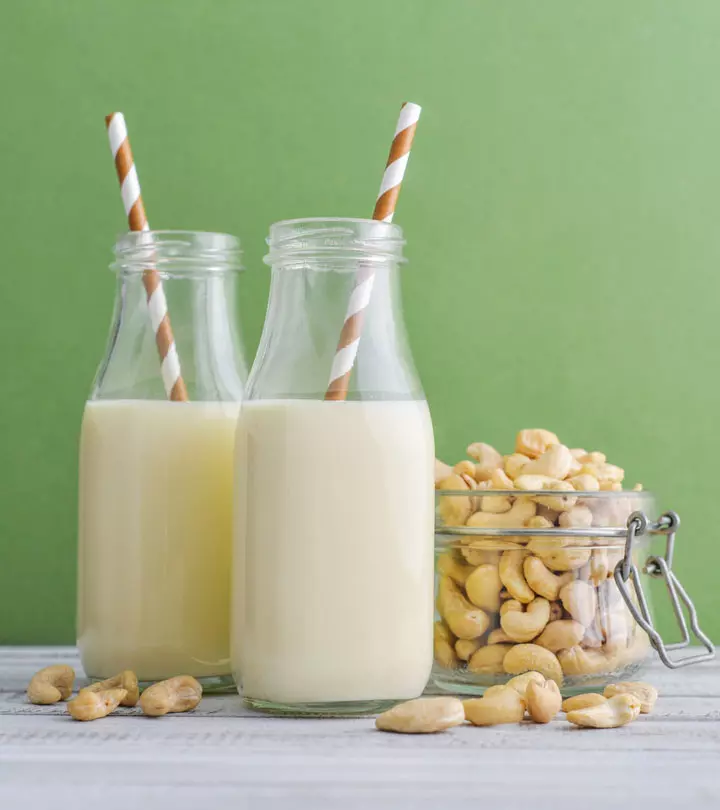
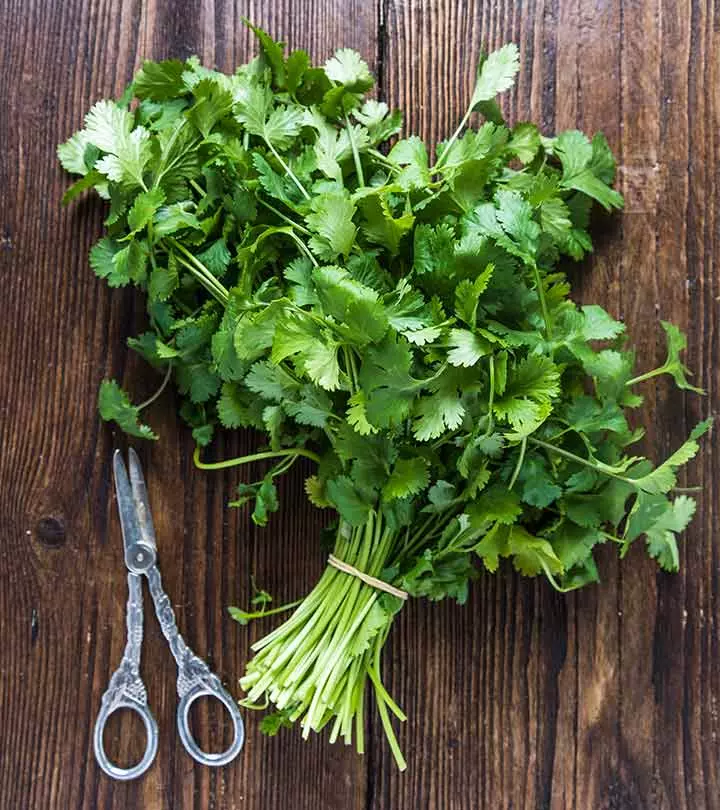
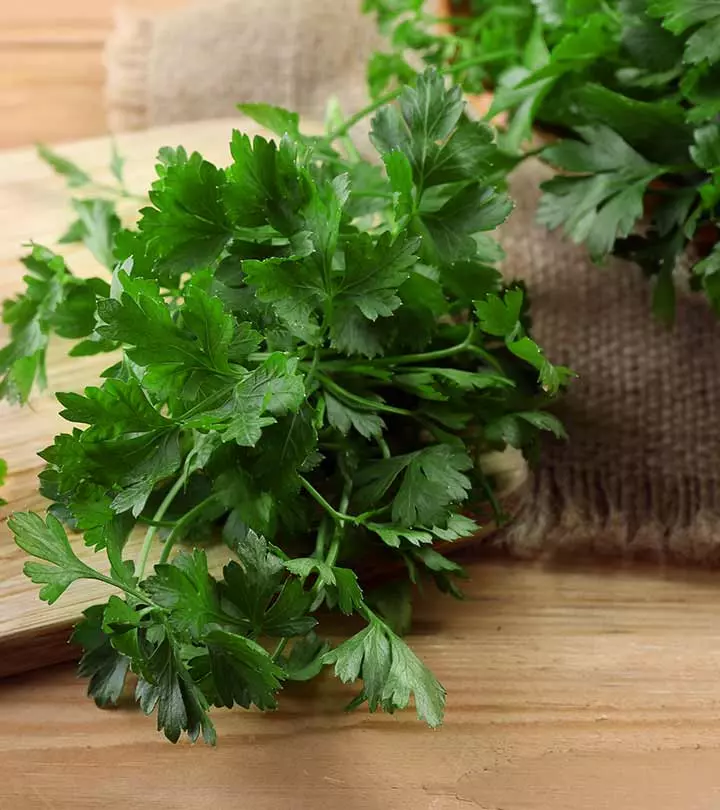
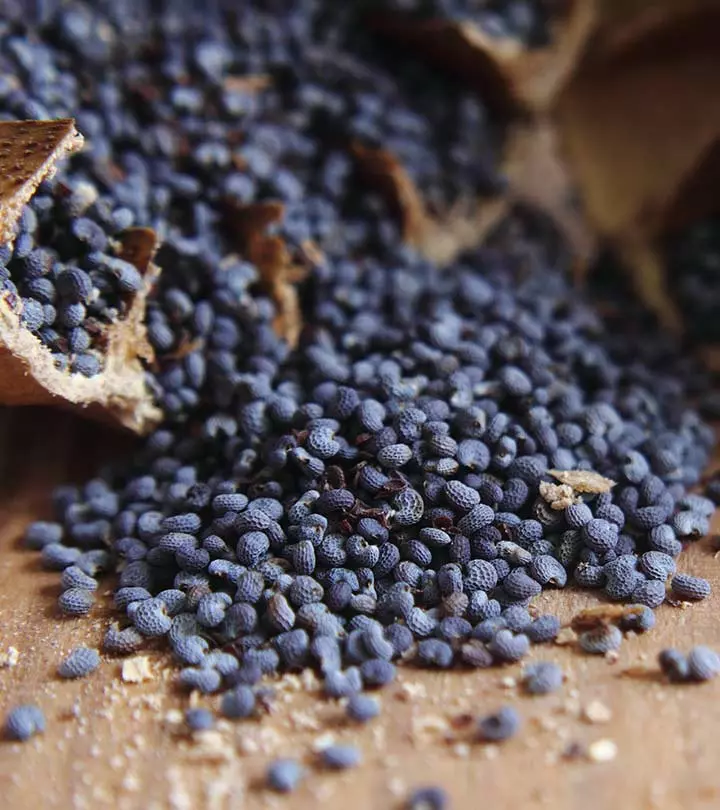
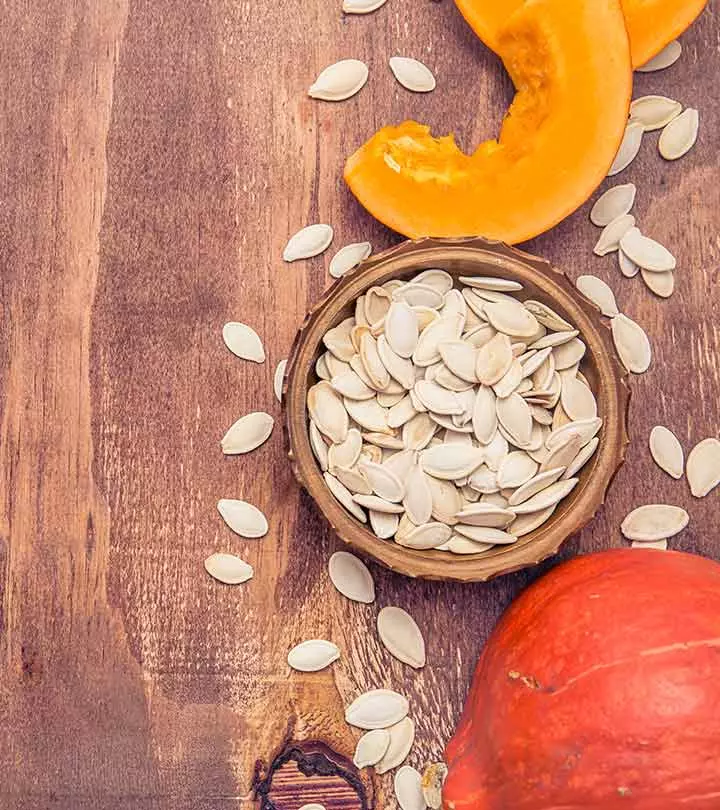
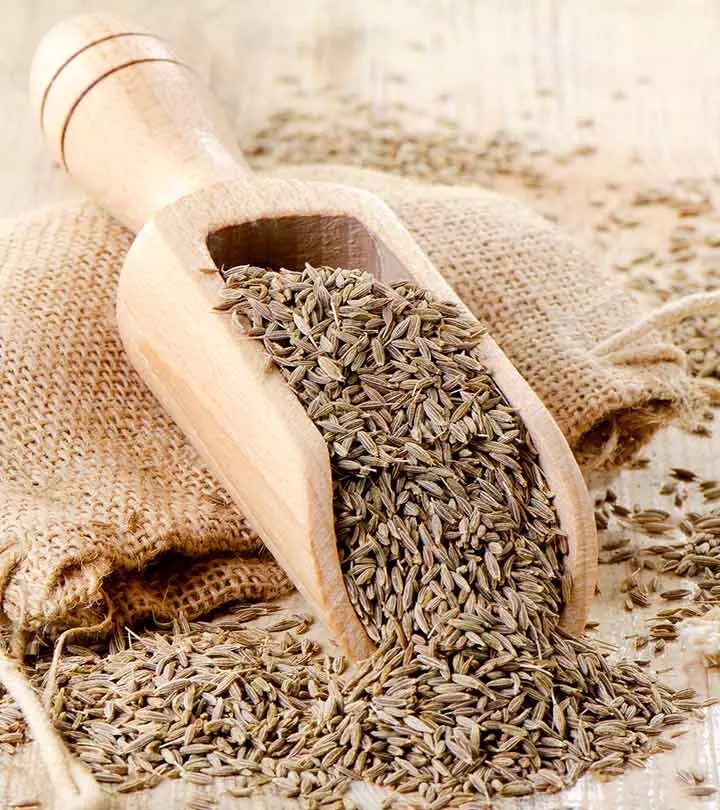
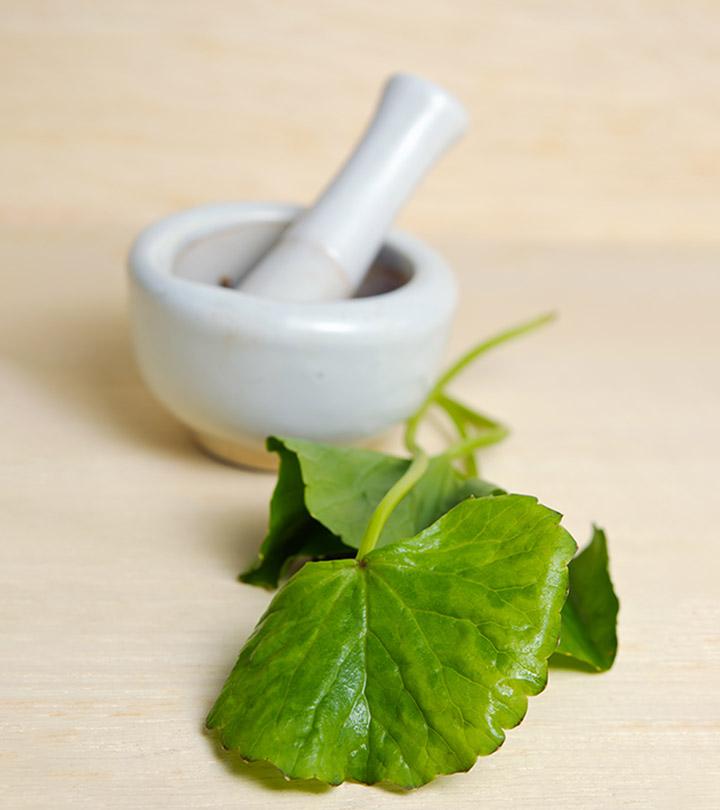
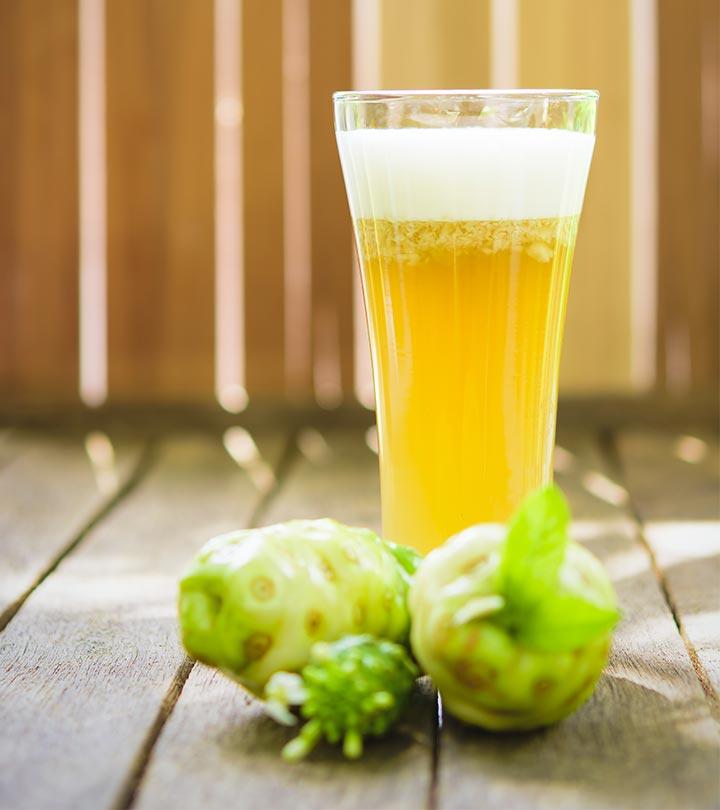
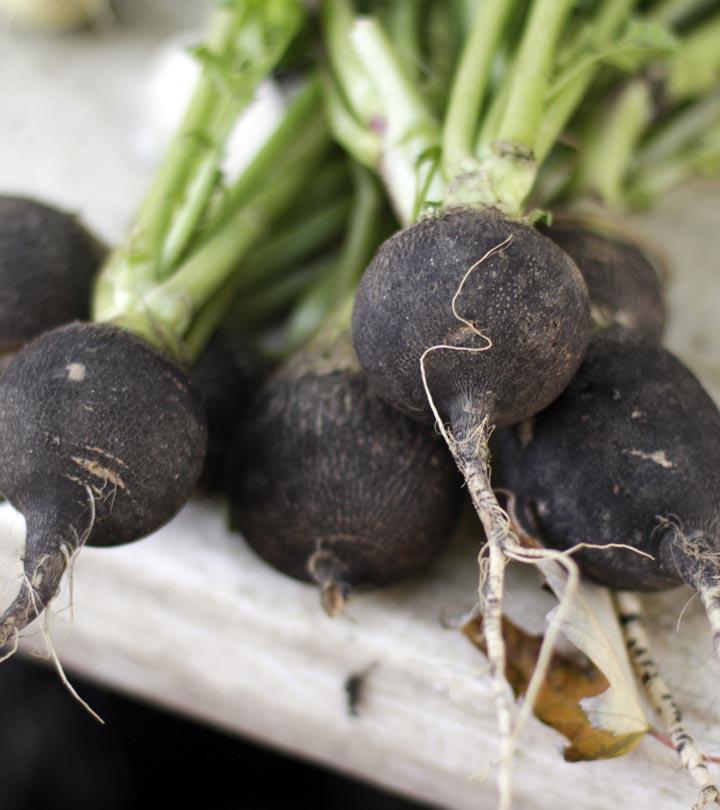




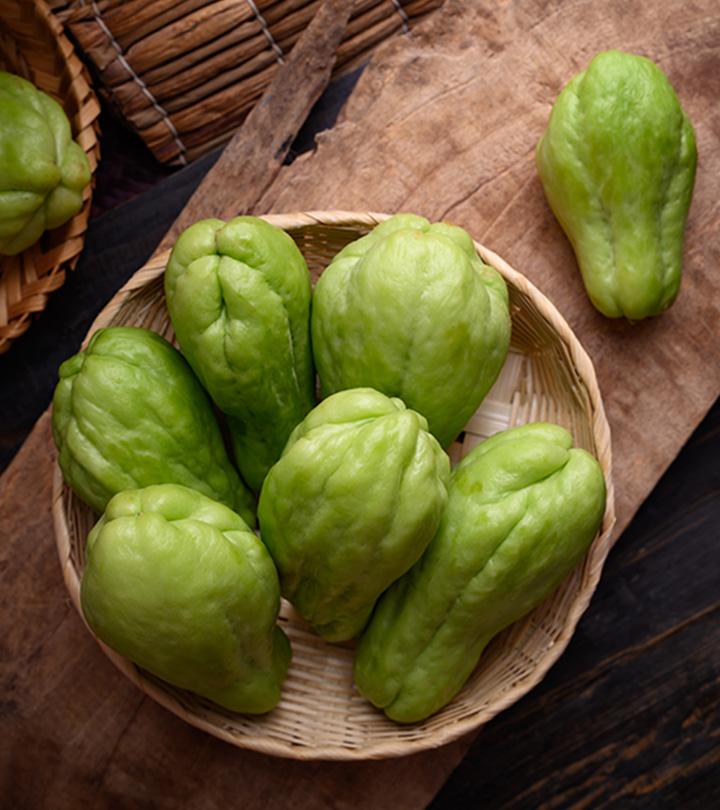
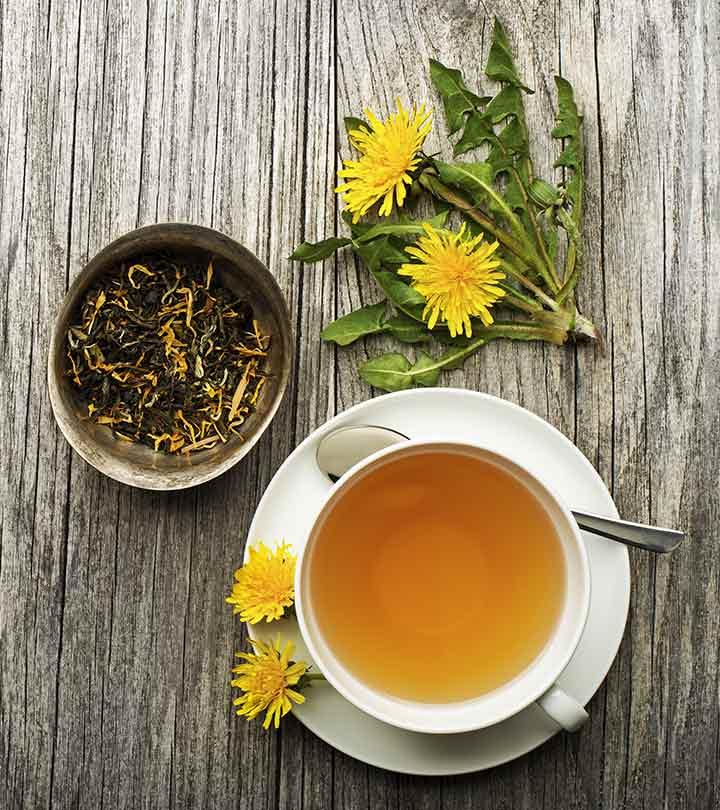

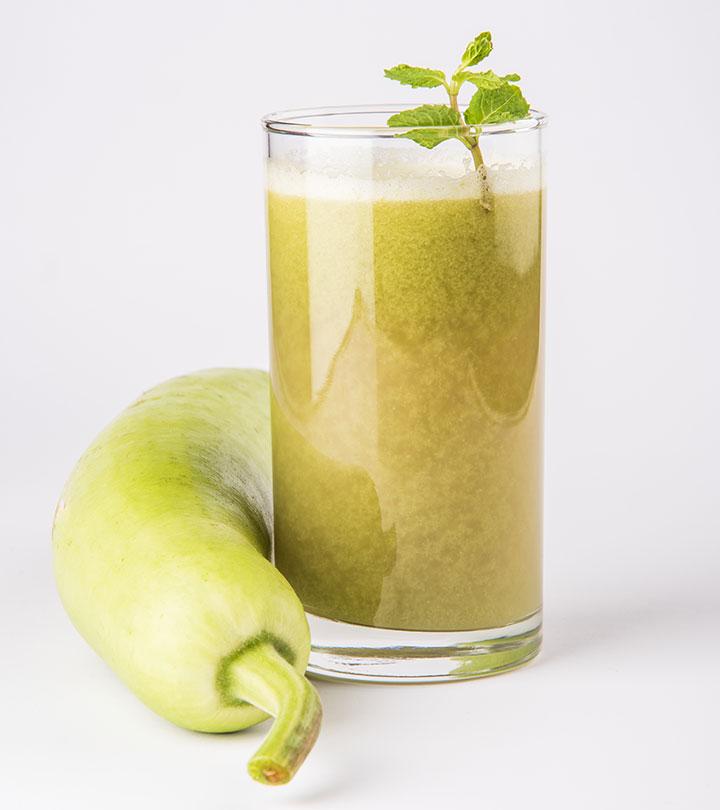
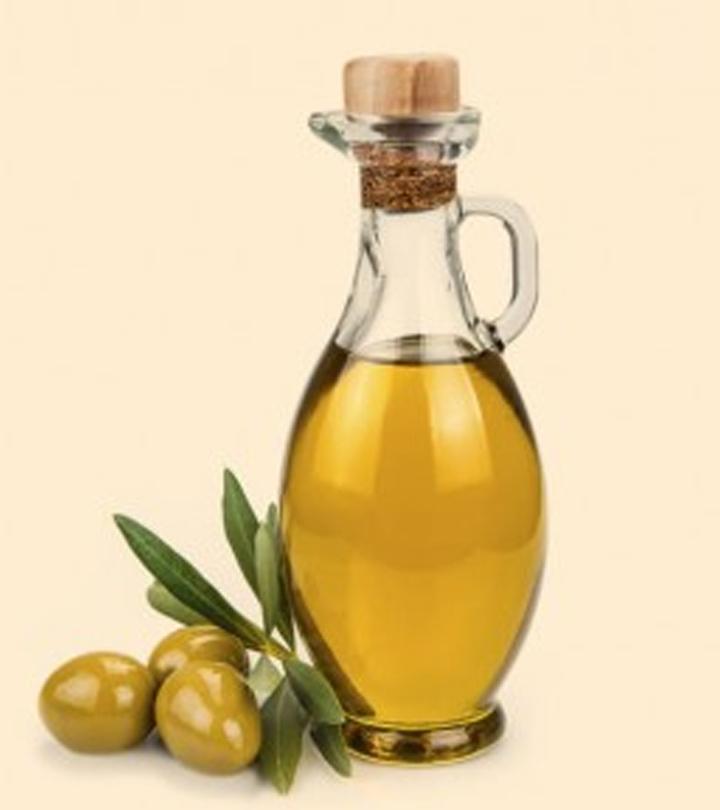
Community Experiences
Join the conversation and become a part of our empowering community! Share your stories, experiences, and insights to connect with other beauty, lifestyle, and health enthusiasts.